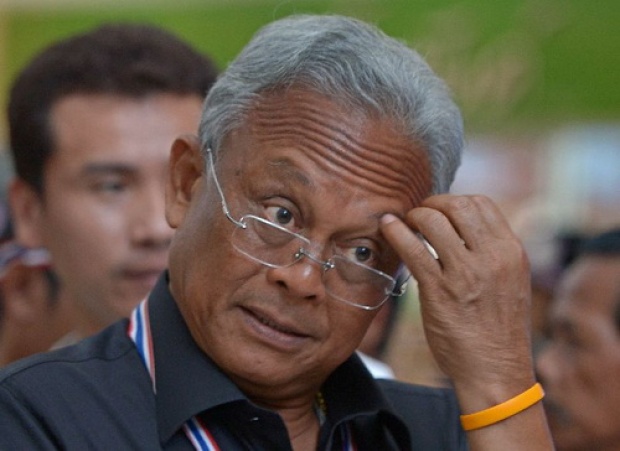 ภาพจาก ข่าวสด
ภาพจาก ข่าวสดไฟแนนเชียลไทมส์ วิเคราะห์ ฝ่ายค้านเดินเกมผิด-ชี้ถ้าอยากยึดกระทรวงก็ไปชนะเลือกตั้งก่อน
หน้าแรกTeeNee ที่นี่ข่าววันนี้, ข่าวหน้าหนึ่ง ข่าวการเมือง ไฟแนนเชียลไทมส์ วิเคราะห์ ฝ่ายค้านเดินเกมผิด-ชี้ถ้าอยากยึดกระทรวงก็ไปชนะเลือกตั้งก่อน
 ภาพจาก ข่าวสด
ภาพจาก ข่าวสดผู้สื่อข่าวรายงานว่า เซกชั่นส่วนบทบรรณาธิการในเว็บไซต์ ไฟแนนเชียล ไทมส์ (เอฟที) สื่อเศรษฐกิจชื่อดังระดับโลก เผยแพร่บทความเรื่อง “Thailand′s Troubles : Opposition should cease the occupation of ministries.” (อุปสรรคของประเทศไทย : ฝ่ายค้านต้องยุติการยึดกระทรวงต่างๆ)
เนื้อหาโดยสรุปของบทความดังกล่าวเอฟทีอธิบายถึงปัญหาที่มาความขัดแย้งทางการเมืองในประเทศไทยที่ดำเนินมาต่อเนื่องหลายปีตั้งแต่ยุคพันธมิตรเสื้อเหลือง ไล่มาจนถึงการรัฐประหารล้มรัฐบาลทักษิณ ชินวัตร การล้อมปราบยิงมวลชนเสื้อแดง และการที่น.ส.ยิ่งลักษณ์ ชินวัตร น้องสาวของพ.ต.ท.ทักษิณขึ้นมาเป็นนายกฯ กระทั่งปัญหาล่าสุดที่ฝ่ายต่อต้านรัฐบาล นำโดยนายสุเทพ เทือกสุบรรณ บุกเข้ายึดสถานที่ราชการต่างๆ
เอฟที ระบุว่า พ.ต.ท.ทักษิณและรัฐบาลยิ่งลักษณ์มีปัญหาหลายเรื่องก็จริง แต่สิ่งที่ฝ่ายค้านกำลังทำถือว่าผิดยิ่งกว่า ข้อเสนอของนายสุเทพที่ให้รัฐบาลลงจากอำนาจแล้วจัดตั้งสภาประชาชน ซึ่งไม่ได้มีที่มาจากการเลือกตั้งนั้นเป็นเรื่องไร้สาระ (นันเซนส์) ทั้งยังเป็นเครื่องแสดงให้เห็นว่า กลุ่มอำนาจของไทยไม่เคยเรียนรู้หรือน้อมรับผลการเลือกตั้ง
ขณะนี้รัฐบาลยิ่งลักษณ์แสดงท่าทีอดอดอดกลั้นอย่างเหมาะสมไม่มีการออกไปไล่ยิงคนซ้ำรอย3 ปีก่อน และควรยึดถือแนวทางนี้ต่อไป
ขณะที่ฝ่ายผู้ต้องประท้วงสมควรยุติการยึดกระทรวงต่างๆอย่างผิดกฎหมายภายหลังจากได้แสดงจุดยืนไปแล้วก็ควรถอนตัว ถ้าฝ่ายต่อต้านรัฐบาลต้องการครอบครองสถานที่ราชการในอนาคต ก็ควรทำ 1 เงื่อนไขต่อไปนี้ให้สำเร็จลุล่วงเสียก่อน นั่นคือ ชนะการเลือกตั้ง
อ่านต้นฉบับที่นี่ : Thailand’s troubles. Opposition should cease the occupation of ministries.
After a nearly three-year hiatus, Thailand has reverted to a depressingly familiar pattern of political polarisation. Ever since 2006, when Thaksin Shinawatra, former prime minister, was removed in a military coup, the country has been bitterly divided between those who love him (the “reds”) and those who loathe him (the “yellows”). The fight is about more than personality. Mr Thaksin, a deeply flawed politician, has nevertheless come to encapsulate the aspirations of a majority of poorer Thais. The ensuing ideological confrontation has spiralled into violence. In 2008 yellows occupied the international airport in their efforts, eventually successful, to force out an elected pro-Thaksin government. In 2010, dozens of Mr Thaksin’s supporters were shot after they occupied parts of Bangkok.
Mr Thaksin still casts a lengthy shadow even though he now lives in exile. In Thailand he faces a two-year jail sentence for corruption after a trial in absentia that he insists was politically motivated. A calm of sorts returned when his sister, Yingluck Shinawatra, was elected prime minister in 2011. The truce was broken in recent weeks when her government tried to pass a wide-ranging amnesty that critics said was aimed at exonerating her brother. The resulting protests have not abated even though the amnesty bill – a clumsy piece of legislation – has since been dropped.
It would be tempting to say “a plague on both your houses”. Three years ago it was Mr Thaksin’s supporters who were on the streets. Today it is the yellows. Accusations of corruption and incompetence against the current government – including for its poorly conceived rice-subsidy policy – have merit. They were equally applicable to the previous Democrat-led administration.
Yet the opposition is more in the wrong than the government. The proposal of Suthep Thaugsuban, the main protest leader, that the government stand down in favour of an unelected “people’s council” is nonsense. It shows that the Thai establishment has still not learnt to accept the result of elections. Ms Yingluck’s government has acted with appropriate restraint. There has been no repetition of the shootings of three years ago. She should ensure it stays that way. Yet the onus is now on the protesters to cease their illegal occupation of ministries. They have made their point and should now withdraw. If they want to occupy government buildings in future, they should fulfil one condition first: win an election.



 กระทู้ร้อนแรงที่สุดของวันนี้
กระทู้ร้อนแรงที่สุดของวันนี้
























 กระทู้ล่าสุด
กระทู้ล่าสุด


 รูปเด่นน่าดูที่สุดของวันนี้
รูปเด่นน่าดูที่สุดของวันนี้
















































Love Attack เทศกาลความรักแบบนี้ บอกอ้อมๆให้เขารู้กัน
Chocolate Dreams สาวชั่งฝันและช็อคโกแลต กับหนุ่มหล่อ ไม่แน่คุณอาจจะได้เจอแบบนี้ก็ได้
Love You Like Crazy เพลงเพราะๆ ที่ถ้าส่งให้คนที่เรารัก โลกนี้ก็สีชมพูกันทีเดียว